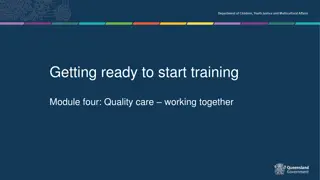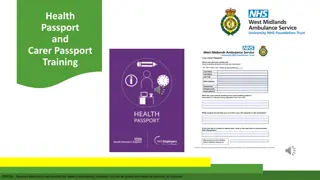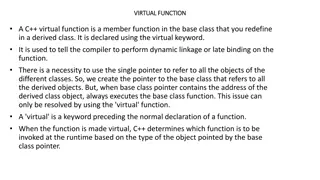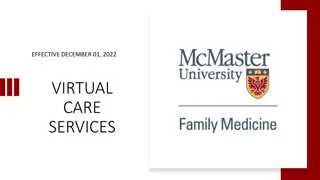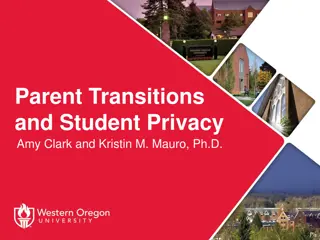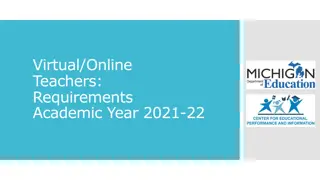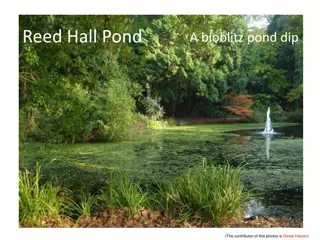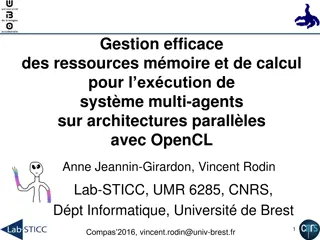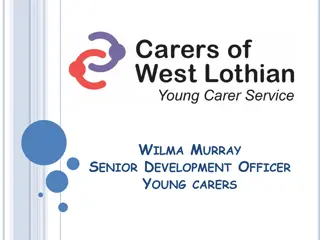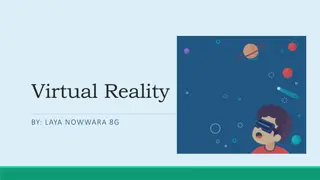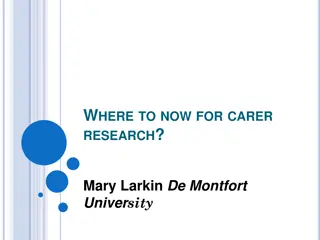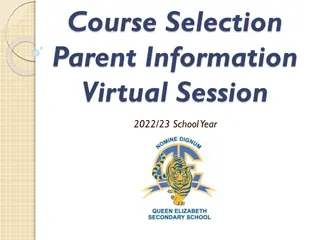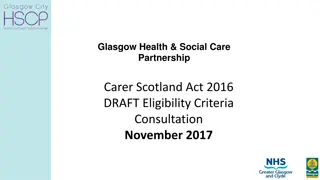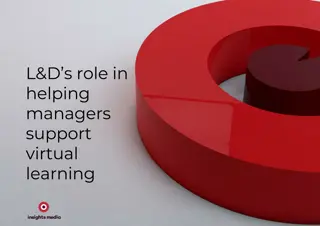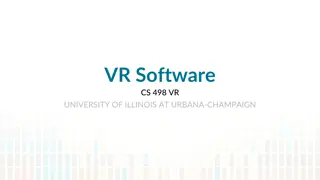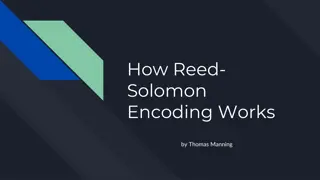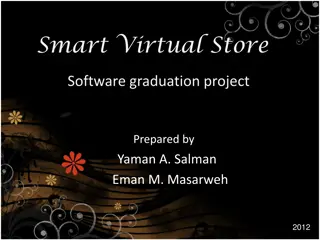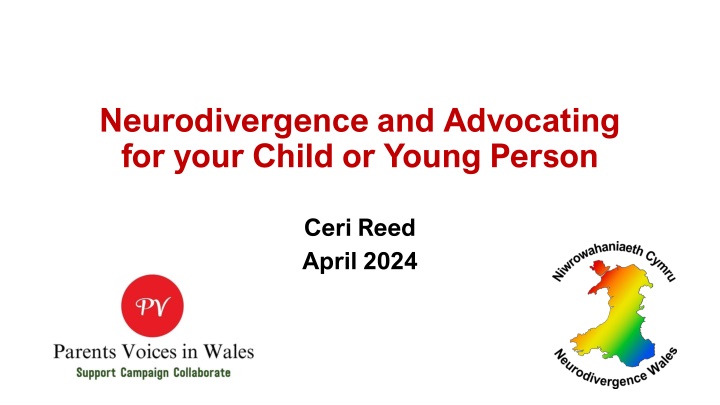
Neurodiversity and Supporting Neurodivergent Learners
Learn about neurodiversity, neurodivergence, and advocating for children with neurodivergent conditions. Explore the importance of recognizing strengths, understanding different learning needs, and creating inclusive environments for all learners. Join the community to support parents and caregivers in navigating the educational system for better outcomes.
Download Presentation

Please find below an Image/Link to download the presentation.
The content on the website is provided AS IS for your information and personal use only. It may not be sold, licensed, or shared on other websites without obtaining consent from the author. If you encounter any issues during the download, it is possible that the publisher has removed the file from their server.
You are allowed to download the files provided on this website for personal or commercial use, subject to the condition that they are used lawfully. All files are the property of their respective owners.
The content on the website is provided AS IS for your information and personal use only. It may not be sold, licensed, or shared on other websites without obtaining consent from the author.
E N D
Presentation Transcript
Neurodivergence and Advocating for your Child or Young Person Ceri Reed April 2024
Introduction Parents Voices in Wales CIC social enterprise company Established in 2018, disconnect between families, education and services Advocating for families : neurodivergent conditions and/or mental health Online community safe space for parents/carers In person adult and parent/carer in person groups Cwmbran, Newport, Bridgend, Cardiff public social media pages Work across the whole system to improve outcomes ie schools, school consortia, Welsh Government and Health Boards We aim to support the early help and enhanced support of neurodivergent learners What is Neurodiversity and Neurodivergence?
What is Neurodiversity & Neurodivergence?
What is Neurodiversity? Neurodiversity; a paradigm of human difference Biodiversity of plants Neurodiversity Movement; support needs & harness strengths Neurodivergent notable differences between strengths and challenges The movement calls for a strengths focused approach Identify strengths/talents; aspirations, purpose; main identity, wellbeing 1 in 5 learners have learning differences eg ADHD, Autism, Dyslexia, Dyspraxia Medical Model, threshold to obtain a diagnosis -----> support Neurodivergent people can 2 or more conditions not all diagnostic levels 'Cooccurrence of conditions is the rule and not the exception' (Prof Amanda Kirby)
Neurodivergent or Additional Learning Needs? 1 in 5 learners think and learn differently Majority of neurodivergent children and young people have an average to high IQ Neurodivergence includes everyone majority don t have LD More Severe/Complex Needs ALN Register/IDP Missing Middle not identified ie not on ALN Register Missing Middle not meeting threshold for assessment/diagnosis One condition diagnosed, others not Behavioural/emotional concerns (dysregulation) eg EBSA, anxiety, depression, self harm, eating disorders, anger, risk taking behaviours It is why we require robust needs led inclusive environments to cater for all learners Whether they have a diagnosis or not!
Balls in a Bucket Prof Amanda Kirby, Do It Solutions
Research Evidence Link between neurodivergence, trauma leading to mental health challenges Neurodivergence, risk of Trauma and poor mental health (Prof Helen Minis, 2021) o Leading to poor mental health - 'carry a heavier load' o Accumulation of social stressors eg neurodivergence, trauma, poverty etc higher risk of poor health challenges (Prof Anita Thapar, Wolfson Centre) Neurodivergence and low school attendance linked to poor mental health outcomes (Prof Ann John 2021) All Wales study by Parents Voices in Wales and ADHD Foundation in 2021 65% on CAMHS waiting lists were ND/seeking assessment (900 participants) Important to reduce the load of these learners by meeting needs early It takes a village ie whole system : ALN Reform and Whole School Approach Working closely with inreach teams from camhs, early help services, third sector Emotional, Social and Educational Needs Estyn highlights the need for collaboration with parents and carers
What is a Needs Led Approach? United Nations Convention on the Rights of the Child
A Needs Led Approach Culture of a school relational, trauma informed and inclusive approaches Understanding on neurodivergence and what needs led looks like in practice Universal Support all learners and supports common presentations o All adults to coregulate o Grounding to aid regulation on transition to classroom o Overview of lesson, recap and consolidation o time management break down tasks and use of visual timers o understanding/remembering instructions writing on the white board o Vocabulary lists/topic words o Frequent movement breaks o Access to sensory toys/doodling o Starting/completing tasks gentle prompts o Support writing mind maps/vocab lists/ipads o Chairs/Seating for Peer support and regulation
Needs Led Approach Additional Learning Provision neurodivergent learners who require Does not require an IDP but can be arranged with ALNCO via TAC/F ALP may change depending on needs/presentation - flexibility Shared access to classroom support Teaching Assistant Access to assistive technology for dyslexia/dysgraphia/dyspraxia Additional study sessions/small group work Flexible start and finish times/timetable/peer mentoring Exit pass to allow movement breaks/sensory room for regulation Graduated response if not meeting needs may progress to IDP Individual Development Plan Legislative document Bespoke plan multidisciplinary team Annual review Long process and requires threshold of severity Impact on learner/family whilst waiting for IDP
Equality and Equity Universal Support is Equality Additional Learning Provision is Equity Some learners will thrive with one and some will thrive with the other Equity meets the Rights of the Child on an individual basis
UNCRC United Nations Rights of the Child (UNCRC) adopted in 1989 Legally binding agreement - protect Human Rights up to age 18 years Welsh Government formally adopted in 2004 There are 42 Articles within the UNCRC underpinned by four core principles o Non discrimination (Article 2) o Best interest of the child (Article 3) o Right to life survival and development (Article 6) o Right to be heard (Article 12) In Article 27 of the Rights of the Child it states that 'children and young people should be able to live in a way that helps them reach their physical, mental, spiritual, moral and social potential' Childrens Commissioner for Wales - The Right Way and a Guide for Parents/Carers
UNCRC within the ALN UNCRC is underpinning in the ALN Reform In School the Additional Learning Needs and Educational Tribunal (Wales) 2018 Act states that : o Schools need to help learners as early as possible to reach their full potential based on their individual needs o Children and families should participate in developing individual plans o This is a legal document which stipulates that professionals must consider the Rights of the Child when they make decisions
Why is Advocacy Important? Children and young people cannot advocate for themselves Trusted adults and/or parents to speak on their behalf Children should thrive in safe and nurturing environments Children have the Right to thrive at home and school o Emotional wellbeing o Social experiences o Education and ability to learn o Spiritual/Cultural wellbeing o Share their views to meet their needs Whole School Approach a culture of shared language and understanding
Schools Perspective Culture of the School Emotional wellbeing of staff Walk in their shoes Number of students Don t assume knowledge about your child Staffing levels/knowledge of neurodivergence and ALN? Workplace inclusion/Whole School Approach for staff The better the culture positive ripple effect They are not the experts in your child They may not have your depth of knowledge They are led by school policies, framed by culture Required to work collaboratively Quality of relationships and dialogue Blog on PV website
Parent/Carer Perspective Disparities in presentation between home and school Relationships have been strained Extended waiting times for CAMHS and ND services or school support/understanding Helplessness - Parental Mental Health and Family Income 100% parents report stress/poor mental health & 76% primary care for mental health support 48% had reduced income from caring for their learner Community Groups for Support eg online groups You are not isolated and support in navigating help Culture shift in Wales NEST/NYTH Framework, Whole School Approach Positive relationships benefit our wellbeing Let's think about what we can do to keep communication constructive
Communication Shelve the frustration! Plan your communication What do you need from them + need to know = support Emotional, Social and Educational Emails time efficient - copy in relevant Is this urgent? Identify your point of contact? Positive relationships? Build on what is strong Trusted Adult? Child's Advocate? Do you require support? Ask for adjustments ie appointment reminders, agendas pre meetings, inclusive communication Consistent and safe relationships whole school approach
The Power of Language Appreciation and empathy Respectful dynamic and keeps dialogue open Acknowledge disparities walk in their shoes o 'I understand that my child's presentation ...... Perhaps we could meet and discuss as I am concerned about ..' Behaviour is not a diagnosis! o Consider the childs needs/triggers? o What needs to change to keep them regulated? o Trauma informed approach Pupil Voice important to include this in every step Meet the child where they are build on the trust Parents as collaborator and strategist
Trauma Informed Language How do adults describe learners ? Describe them by their strengths and needs From home to school 'Don t make their worst characteristic their main identity' (Dr Karen Treisman)
Language in an IDP Not open to interpretation Stipulate specifics : Needs of the child Name staff by role/specialism Pupil Voice! Details of time allocation of staff and arrangements in their absence Days and times of interventions/therapies Details of mode of monitoring, evaluation of outcomes and plan of action to adapt interventions Details in advance of meetings, those attending and why Request a note of meeting Ask to be included in any emails, discussion with services Pre meeting to the annual review
Language at Home Avoid negative language Validate but rationalise Do not frame school as an unsafe place Impact learner perception of school ripples or waves Demonstrate a union of support eg 'Team Child Name' Name professionals 'Team Child Name' Remember positive experiences/achievements Embedding self belief ...'that was difficult for you but you did it' Provide hope for the future difficult periods are a journey not your final destination Mirror neurons model problem solving
Coregulation Neurodivergence carry a heavier load reduces window of tolerance Coregulation to reduce anxiety and stress at baseline Connection before Correction or Regulate and Relate Lower the voice, talk more softly, slowly Consider body language keep it open Consider your facial expression Think about the words you use Model calmness Walk away from triggering situations Skill to be learned home and school Dr Pooky Knightsmith Podcast/Webinar on Coregulation and Window of Tolerance
How to Advocate for Your Child Relationships, communication, language and coregulation Relationships + dialogue = needs led appproach How we communicate and what we communicate will be central to process Basic examples o Social peer mentoring, safe places at breaks, anti bullying intervention, toileting o Emotional exit pass to regulate, trusted adult, access to counselling, teach self regulation, address the worries of the child o Educational gentle prompting to start/stay on task, movement breaks, laptop for classwork, shared TA support Providing solutions more helpful SNAP Cymru/Parent Groups that can support you Pupil Voice Resource on PV Website
Do's and Dont's of Advocacy Do...... Do...... Do Not... Do Not... Identify your trusted person and request they be your point of contact build on what's strong Expect everyone in the school/service to know about your child or your situation Work to build a positive relationship with the trusted person and show your appreciation of their efforts Raise your voice/shout Put important information in an email and request a follow up meeting/email Outline the issue and suggest a solution it can help frame support earlier Take someone with you to meetings to take notes Overly chase a response is it urgent? Telephone when upset/angry it may delay progress Go to meetings alone, take a trusted person Ask for agenda pre meeting, who will be in attendance and ask for a copy of the notes of meeting Waste time on past issues, make the most of the time you have in the meeting Request Advocacy for a child or young person from a trusted person or SNAP Cymru or NYAS for cared for children Advocacy - Snap Cymru Parent Advocacy | Parent Advocacy Service | NYAS Forget to ask for a follow up meeting to monitor outcomes of agreed interventions/support
Strength Focused Approach Meeting Needs and Creating Aspirations What are they good at good at + What do they enjoy Identify and name strengths daily Make their strengths strengths their main identity! o Compassionate + Animals = Veterinary Nursing o Energetic + Cooking = Chef o Reading + Science = Researcher/Teacher o Problem Solving + Maths = Accountant/Maths Teacher o Social Justice + Socialising = Politics/Third Sector/Entrepeneur How canstrengths be used in school? Look at Career Wales work backwards to find their path enjoy = Aspirations Aspirations
Families Experiencing EBSA Do It Profiler Childrens profiles, age 7 to 16 years ( 25 per person) Not diagnostic but identifies needs/strengths - provides report Objective assessment share with school ALNCO Coproduce a plan for support Small steps child led not parent/school led 'Meet the child where they are' and build slowly Social, Emotional and Educational Needs Relationships with Trusted Adult important Strengths focused approaches and coregulation important Consistent connection leads to regulation connection before correction Join a parent led group to support you/signpost to information
Importance of Self Care As parents/carers your wellbeing is paramount You cannot pour from an empty cup So you can function better you need time for you Please make time every day fit in 5 minutes regularly Remember children and young people mimic our behaviours so set an example of self care Immersing yourself in your interests is good Who can support you you need time Check out the Dewis Database online, the Family Information Service or your local third sector and find out what is available near you : o Arts and Crafts o Family Walks o Sports and Exercise o Wellbeing Support eg Mindfulness The more room in your cup, the more effective the coregulation at home
Info/Support for Families Families First/Family Information Service early help for children/YP and families WLGA Neurodivergence Team website information/resources Parents Voices in Wales CIC online group/meet ups Childrens Commissioner for Wales o Information and Advice service - All children up to age 18 o Looked after children up to age 21 or if still in education up to age 25 o NYAS can provide advocacy and advice for care leavers SNAP Cymru helpline and resources on website Welsh Government information and advice for parents/families on website
Info/Support for Families o Action for Happiness Family Advice to promote positive wellbeing o ADHD Foundation Neurodiversity Charity - ALCN o Autistic UK/National Autistic Society website and local groups o British Dyslexia/Dyscalculia Association o British Dyspraxia Association charity is closing soon o Creative Education Dr Pooky Knightsmith webinars/resources o Disability Wales Equality Act 2010 Advice and Support o FASD Cymru parent support group/information o Kidscape antibullying and helpline o Learning Disability Wales Equality Act 2010 Advice and Support
Info/Support for Families o Mental Health UK advice for parents and carers o Neurodiversity Celebration Week o Neurodiversity in Business neurodivergent friendly companies o PDA Society Pathological Demand Avoidance/Opposition o RADLD Campaign Developmental Language Disorder o ReachOut ASC Lynn McCann o Scope Charity support with applying and finding employment o Tourettes Action UK Tics and Tourettes o Witherslack and Neurodiversity Celebration Week : free webinars and resources
Thanks for listening! Follow us on... Twitter & Facebook @PCAMHS


